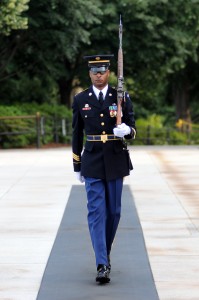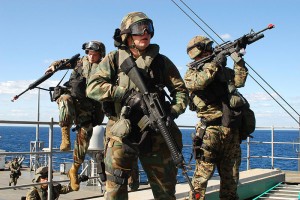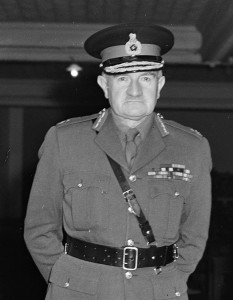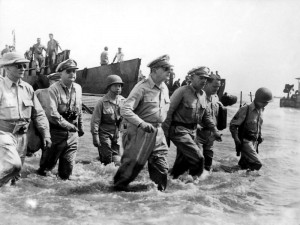
By Lieutenant Colonel David G. Bolgiano, USAF, Retired*
Alexandre Havard writes in Virtuous Leadership on the importance and relevance of the cardinal virtues – prudence, fortitude (or courage), temperance (or self-control) and justice – to both leaders and organizations. Any person or group that lacks in one or more of these core character traits is doomed to failure. As William Penn, the founder and namesake of Pennsylvania, said:
Read the popular article: We Must Resist the Temptation to Secession
Governments, like clocks, go from the motion men give them; and as governments are made and moved by men, so by them they are ruined too … Let men be good and the government cannot be bad … But if men be bad, let the government be never so good, they will endeavor to warp and spoil it to their turn.
Likewise, our military depends on good people to lead and man it. Historically, it has consistently embraced the cardinal virtues to better ensure a spirit of selfless sacrifice and service amongst its members. Herodotus’s commentary on the duties of the ancient Persians, “to ride well, shoot straight, and speak the truth,” recognizes that there are absolute truths and an internal moral compass that warriors should follow.
These beliefs have formed the cornerstone of our military’s ethos. It is now under subtle attack by those that decry such beliefs as antiquated or even unconstitutional. Such efforts must be soundly repulsed, as military leaders’ moral compasses must be immune to quaint notions of modernity that recognize no fundamental truths.

For years, living by the cardinal virtues has inoculated the military from self-absorbed, licentious behaviors such as one routinely observes in Hollywood and professional sports leagues. America’s modern military culture has fairly consistently remained above the fray of partisan politics and the gutter of licentiousness. Unfortunately, there are those trying to change that very culture by marginalizing the voices of virtue within our force.

If the Armed Forces of the United States is to remain a dominant player in geopolitics as well as a guardian of our populace, it must not proceed under the false belief that aspiring to live virtuously is somehow an antiquated and irrelevant modality for a postmodern world. The first obstacle often thrown out by those objecting to infusing virtue’s lessons into policy is that doing so somehow violates the Constitution of the United States’ First Amendment’s Establishment Clause, which proscribes a formal church-state relationship. Such an objection is a canard that is predicated on ignorance of history and the law. Historically, discussions of the cardinal virtues can be found not only in all of the world’s major religions, but also in classical literature and philosophy. Legally, those that rail against any open religious activity in the military, such as the presence of a Chaplains’ Corps, seem to ignore the Free Exercise Clause of that very same Constitutional Amendment. Sadly, these voices have found traction of late within the Executive Branch.
The Cardinal Virtues
Prudence or Competency

As Francis Bacon noted, one rarely finds a wise head on a young body. Hence, this virtue, like all the others, must be taught and learned. Aristotle defined prudence as recta ratio agibilium, meaning “right reason applied to practice.” In the military, this is reflected in a commander who has mastered fundamental tasks so well that in the fog of war these are enabling, rather than distracting. At a purely tactical level, it is that Visit Board Search and Seizure (VBSS) team member so intimate with his weapon systems that he can focus on potential threats, not on whether his weapon’s selector switch is on safe or fire.
When a leader consistently makes wrong decisions – or makes rash decisions, right or wrong – then that individual is imprudent. Due to the complexity of the modern battlefield, it is easy to err in this fashion. Accordingly, competent leaders seek the counsel of others and quickly learn to delegate responsibility and authority to trusted subordinates. They also encourage freethinking amongst their staff. Those assigned to a dysfunctional staff, where the commander browbeats those who disagree, will instantly recognize this lack of virtue in their boss. “Don’t be the nail that sticks above the surface” is the unspoken advice in such commands. Sadly, courageous subordinates are often crushed; while sycophants, or those who simply remain silent, get promoted.
Prudence or competency is the result of practice. But, it also may require personal humility. Disregarding the advice or warnings of others whose judgment does not coincide with one’s own may be a sign of imprudence. It is possible that the commander is right and his staff wrong; but the opposite may be true, especially if the commander is consistently disagreeing with those whose demonstrated judgment is sound. Absent a moral barometer, either derived from natural law or the Ten Commandments, there is no measure of right reason. Accordingly, bad commanders will simply bully others to get their way. That is why assaults upon the military’s seemingly archaic moral code are so intrinsically dangerous. For he who believes in everything believes nothing and, consequently, lacks a compass by which to steer a true and straight course.
Justice
Prudence or competency is the internal focus of one’s intellectual abilities: the application of right reason to a given problem. Justice is more outwardly focused. It is that trait which seeks to give everyone his or her rightful due. This requires much more than simply abiding by the rules set forth in the Uniform Code of Military Justice (UCMJ) or General Orders. While maintaining discipline in the Armed Forces is very important to the orderly conduct of military operations, and most people desire and expect malefactors to be brought to justice, the virtue of justice is much greater than the sum of what is set forth in those rules and procedures. Good commanders utilize justice as a positive motivator on the path toward a humble and magnanimous career for themselves and their subordinates.

Members of a successful military command are more concerned with respecting the rights of others and giving them proper credit where credit is due. It was said of Field Marshal William Slim, Commander of the China-Burma-India Theater of Operations in World War II, that he never said “I,” rarely said “We,” and always said “You.” Sam Damon, the protagonist in Anton Myer’s brilliant novel Once an Eagle, further exemplifies such a person. Damon is a professional warrior who puts duty, honor, and the men he commands above self-interest. He justly earns his promotions. The book’s antagonist, Courtney Massengale, is an unjust, self-absorbed bully who advances by political scheming and trampling upon subordinates and contemporaries. Once an Eagle should be mandatory reading for all officers and non-commissioned officers.
Justice also requires an acknowledgement of and obeisance to the natural law or divinely-inspired law. Absent such a framework, we are left with simply the subordinate laws and whims of man. We would be well served to remember that Adolf Hitler did nothing illegal under the laws of the Third Reich. The reason that Hitler’s acts were so unspeakable is that they contravened Divine or natural law. A just leader respects both the natural rights of others (to be secure in life and limb, their obligations to family and associates, fundamental property rights, and to practice one’s religion and hold sacred beliefs) and the legal rights of others (command authorities, the UCMJ (Uniform Code of Military Justice), personal contract rights, and other rights and entitlements found under the law). Should legal rights ever come into conflict with natural rights, however, the latter take precedence. Hence, a warrior has both a right and an obligation to disobey clearly unlawful, unethical or unconstitutional orders. Without an underlying concept of right or wrong – what is justice – how would a service member ever be able to discern this?
Courage

One may assume that anyone donning the uniform of the Armed Forces has physical courage. However, what is being discussed here is an overarching moral courage. A person could be physically courageous enough to charge a machine gun nest, but still be a moral coward in other important leadership capacities. Moral courage, or fortitude, is that rock-steady virtue that seeks to elevate others above self. Competency and justice are the virtues by which we decide what ought to be done. Courage provides us the will and strength to do so, even in the face of obstacles. For day-to-day life, it is the constant practice of seeking and speaking the truth in the face of adversity or peer pressure to do otherwise. It is what gives that subordinate staff officer the strength to raise a hand during a command briefing and disagree with a politically expedient, but morally wrong or unjust, course of action.

Courage may require one to speak out against voguish but evil spirits of the times, impure conduct or trends, and the common tendency to seek the path of least resistance. It also requires one to speak the truth even if doing so may be personally painful: “For if we sin willfully after that we have received the knowledge of the truth, there remaineth no more sacrifice for sins.” (Hebrews 10:26)
The New Testament also speaks to those who “are willingly ignorant.” The meaning is the same. It is one thing to be unaware of the truth; it is altogether different when people know what is true, yet ignore it out of cowardice or political expediency. By a casual reading of today’s headlines, it appears to all but the naïve or complicit that many of our senior military leaders have failed to stand up for what they must, in their hearts, know to be right and just. This is likely for want of courage.
Self-Control or Temperance

Epistemologically, self-control or temperance demands control of one’s animal desire for pleasure. We wring our hands and wonder why so many of our warriors commit acts of sexual assault; and, how come so many flag officers commit other diverse acts of moral turpitude. Often, these acts are a failure to moderate desires in the face of temptation. Self-control is that virtue which attempts to overcome the human condition best stated as “The spirit indeed is willing, but the flesh is weak.” But, if we have institutionally disavowed the notion that there are fundamental rights and wrongs, is it any wonder we are in this quandary?
However, self-control is much more than just tempering base sexual desires. In the realm of virtuous leaders, self-control might mean that choleric personalities restrain their tempers; impatient persons exercise listening skills; tardiness is replaced by timeliness; or phlegmatic persons make an effort to be more outgoing. “Everything that grows begins small. It is by constant and progressive feeding that it gradually grows big.” This notion applies to seeding and growing virtue in organizations and individual lives. Taking such seemingly small steps can gradually build a command imbued with a sense of unit humility. It can truly help transform an organization from a dour, miserable workplace to a magnanimous command where people are excited and proud to serve.
Magnanimity is an underutilized and not frequently understood word. It is the loftiness of spirit enabling one to bear trouble calmly, to disdain meanness and pettiness, and to display a noble generosity. It is the essence of chivalry. A magnanimous person is the opposite of a pusillanimous or small-minded person. Every military leader should strive to foster an environment where magnanimity flourishes. Absent a deep understanding and practice of the cardinal virtues, however, such a goal is futile because the leader lacks the inherent capacity to foster unit humility and magnanimity.
Words of Caution
The dangers for the military not acknowledging and living pursuant to the cardinal virtues should be obvious. But, when one considers how to boil a frog, the pitfalls may not be as obvious as they once recently might have been. Just consider the myriad “hot button” issues, critical to the continued integrity and strength of our military, which have now all but been placed “off limits” by senior leaders who seem more concerned with keeping their stars than speaking or hearing the truth. For example, any rational discussion concerning these topics – (1) the possibility that core tenets of Sharia law are incompatible with a Constitutional Republican form of governance that respects religious freedoms; (2) forced affirmation of vice in the form of acceptance of homosexual conduct within our forces; and (3) the inclusion of females into units routinely expected to be engaged in close quarters combat (CQB) missions – has been effectively quashed in today’s military. This is true, despite the fact that a majority of those serving have principled questions about each of these topics.
But anyone that now questions the wisdom of such policies is, at best, quickly marginalized. Truth, or at least rational attempts to discern the truth, has been labeled as “Hate Speech.” In some instances, as in the case of Army Lieutenant Colonel Matthew Dooley who was crushed by the Chairman of the Joint Chiefs of Staff for daring to raise the aforementioned Sharia issue, otherwise stellar careers are ruined for not toeing the party line. We should do well to heed the words of Isaiah: “Woe to you that call evil good, and good evil: that put darkness for light, and light for darkness: that put bitter for sweet, and sweet for bitter.”

While it is imperative – as General of the Army Douglas MacArthur tested during the Korean War – that the military remain subordinate to its civilian masters in matters of policy and strategy, it must nevertheless vigorously resist attempts to dilute its core values by means of crass political bullying. Moreover, if there are rational and moral concerns about any policy or course of action, voices expressing such concerns should be encouraged, rather than quelled or shunned. Sadly and dangerously, this does not appear to be happening in today’s military.
Trends to muzzle the virtuous voices in the military must be reversed if our Navy, Marine Corps, Air Force, Army and Coast Guard are to remain morally fit and strong. The silence of the admirals and generals has been deafening in this regard. Six years into this Administration’s grand experiment to radically transform America has caused serious erosion in our military’s capability and discipline; yet, we hear crickets instead of voices of truth and moral incorruptibility from our flag officers. Consequently, we now have a military that appears more concerned with providing benefits to random sexual partners or forcing the square peg of “gender” equality into the round hole of readiness.
No objectively honest person should be surprised that an overwhelming majority of female candidates simply can’t make it through physically demanding courses such as the Army’s Ranger School, Marine Infantry Officers Course, Basic Underwater Demolition School (SEAL-BUDS) and Special Forces Qualification Course. By not accepting the fact that “war is hard” and close-quarters combat is necessarily a realm for masculine males, the military scrambles to change the standards to ensure “sex” equality occurs despite costs to our readiness.

When it comes to matters of national defense, specious beliefs in the physical equality of the sexes should not trump the harsh reality of the battlefield. There is a reason there are no female athletes in the National Football League (or any other professional sports league): men are better suited to such physical conflict. All the politically correct thought and indoctrination in the world can’t change this fact of nature and God’s design. If we allow courts or policy makers not anchored by virtues to challenge this immutable truth, we will end up not only with boring sports contests but also a less effective combat force. But, first, we must acknowledge there are immutable facts and truths. Voices of reason and truth, like that expressed by Marine Captain Katie Petronio, are few and far between in this discussion. They appear entirely absent amongst our flag ranks.
Repeating lies loudly and often enough does not make them true. Senior leaders must not simply parrot the opinions of their political masters. Sometimes, the cardinal virtues demand they speak the truth. But, perhaps paralyzed by the fear of losing their stars or not getting a “top block” on that section of their fitness report that demonstrates the proper degree of political correctness, most will remain silent.
Subordinates watch and learn from their leaders. If those leaders go into defilade instead of standing up for what is virtuous, what lessons will be passed down to the next generation? This is not a matter of arguing the value of one combat system over another or the next evolution or revolution of warfare. This is about retaining core virtuous principles that spawn courage, truth and selflessness.

Citizens expect such high standards from their Armed Forces: it is why a Marine Corp Private stands head and shoulders above “Occupy Wall Street” types or the likes of Bradley (Chelsea?) Manning. Service members must forfeit many of their erstwhile civilian idiosyncrasies – faddish haircuts, sleeping late, using illegal drugs, and being couch potatoes – in order to become part of a greater whole. First and foremost, our Armed Forces should be a corps of moral, disciplined, steely-eyed killers – exemplified by distinguished commanders such as Arleigh Burke, Chesty Puller and Jim Mattis – that can close with and destroy our Republic’s enemies on the seas and fields of battle. Hence, we must never forget to ride well, shoot straight and speak the truth: even if doing so ruffles some political feathers. Our warriors deserve nothing less.
About the Author:
Lt. Col. David G. Bolgiano is a retired paratrooper who has deployed to Iraq and Afghanistan on multiple occasions. He is the author of Combat Self-Defense: Saving America’s Warriors from Risk-Averse Commanders and their Lawyers and co-author of Fighting Today’s Wars: How America’s Leaders Have Failed Our Warriors.



